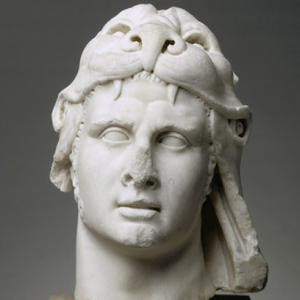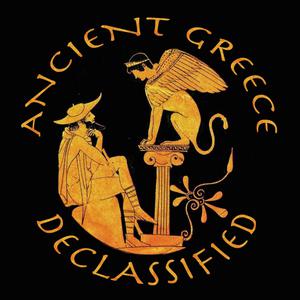
History in the Making
Rob Sims
HITM uses character focused storytelling to convey the ideas of the past that have shaped us today. We dive into wars and politics to see how the values of nations and their populations have reacted to the world around them. This is social evolution and biography wrapped in storytelling. This is History in the Making. HITM is currently in Season 1. Season 1 covers much of the classical age of Greece including the “invention” of democracy, the Persian Wars, politics of Pericles and Themistocles, the Golden Age, the Peloponnesian Wars, and much more.
- 1 minute 46 secondsThank YouThank you all for listening over the years. The show will going dormant for a while but I hope we can continue our stories in the future. Feel free to stay in touch until then. website: www.hitmpodcast.com facebook/twitter: hitmpodcast18 June 2019, 1:45 am
- 42 minutes 13 seconds28: Epilogue with Dr. John Hale
Today we welcome Dr. John Hale to the show, author of the book Lords of the Sea. It is a compelling look at the history of Athens, largely from the seat of a rower’s bench behind an oar. The New York Times has called Dr. Hale an intellectually series historian who knows how to tell war stories, and I couldn’t agree more. Of course, we spend a good bit of time inside the wooden walls of a trireme and we also spend some time with the various leaders of Athens. He also provides some salient comparison to the United States and how our democracy runs before giving us a preview of the new book he is working on! Find his book here at: https://www.amazon.com/Lords-Sea-Story-Athenian-Democracy/dp/B002WTC8R0.
5 May 2018, 5:55 pm - 36 minutes 48 seconds27: Epilogue with Dr. Melissa Lane
Today we welcome Dr. Melissa Lane to the show, author of the book The Birth of Politics. Her book was the final straw in convincing me to start the show and centers around eight political ideas, what they meant to the Greek and Romans, and why they matter today. She provides some clarity to different Athenian institutions and I take advantage of her expertise to have her critique some of the thoughts I had while doing the show. We wrap up with a few question on how the story of Greece can change the way we live today. I think you will enjoy our conversation and if you want to learn more about Greece, Rome and about the foundation to the political ideas of today, then pick up her book: The Birth of Politics: https://www.amazon.com/Birth-Politics-Eight-Political-Matter/dp/0691173095.
26 April 2018, 9:19 pm - 1 hour 20 minutes26: Legacy
Athens leaves us their legacy in the Season 1 finale. https://www.nasa.gov/multimedia/imagegallery/image_feature_1604.html
18 April 2018, 1:00 am - 46 minutes 40 seconds25: A Splendid Rope
The Peloponnesian War comes to a sudden and unexpected end. The defeated will face the fate the victor thinks it deserves. We witness both timid and brutal approaches to war and are forced to ask: Is there a difference between acting cruelly out of desperation versus cruelty as a matter of course? This episode covers approximately 405 B.C. – 404 B.C.
27 February 2018, 6:00 am - 1 hour 9 minutes24: Liquidation
More than twenty years into the Peloponnesian War Athens has given nearly everything to the fight, but more is required. Sparta requests peace but Athens refuses and looks for more resources to continue the war. While Athens scrounges for money, Sparta and Persia renew their alliance with Sparta leading the fight while Persia funds the war. Meanwhile, the weight of carrying the Athenian military is beginning to crack their society. This episode covers approximately 407 B.C. – 405 B.C.
6 February 2018, 3:20 am - 43 minutes 2 seconds23: Resurgence
Athens is broke. The sole hope for retaining its empire rests in their fleet of triremes at Samos. To make matters worse a Spartan fleet, supported by a Persian army and Syracusian ships, has wedged itself into the Hellespont, the crucial route by which Athens receives most of its food. Alcibiades, though still refusing to return to Athens for fear of the death penalty on him, contributes to the fighting in any way he can. Some sort of miracle is needed for Athens to step back into security. This episode covers approximately 411 B.C. – 407 B.C.
8 January 2018, 1:50 am - 55 minutes 5 seconds22: Traitor is Such an Ugly Word
After the disaster of the Sicilian Expedition, the largest defeat in the history of Athenian Democracy, the whole Mediterranean world expected Athens to fall. Refusing to surrender the Athenian assembly accepts previously unthinkable changes in order to continue to the fight against Sparta, the revolting cities across the Empire, and to keep the ever ambitious Persians in check. Amid this pressure the democracy in Athens is reexamined and some citizens desire a change, either through legal reforms or terror tactics. This episode covers approximately 413 BC – 411 BC.
22 December 2017, 5:31 am - 1 hour 33 minutes21: Echoes of Glory
Nicias and Alcibiades have both gained political power but can’t push past the other. The gridlock is broken when representatives from a Sicilian town show up asking for help and offering to foot the bill for Athenian assistance. In a rapid escalation, the Athenians agree not only to help but to send an armada to Sicily to bring down Syracuse. One step at a time the Athenians throw everything they have into the Sicilian expedition. This episode covers approximately 416 B.C – 413 B.C.
7 November 2017, 6:01 am - 1 hour 17 minutes20: That Leviathan
Nicias and Alcibiades struggle for control of Athens after a power vacuum appears. The back and forth leads to an Athens that pursues no grand strategy but plays a game of rapid, hectic tactics. All of Greece is swept up in political pinball as the traditional allies of Sparta reconsider their place in Greece and Sparta struggles to reclaim its political standing. As the stakes rise, Athens rebrands its role as the head of its empire and does whatever is necessary to keep control. This episode covers approximately 421 B.C. – 415 B.C.
13 August 2017, 5:01 am - 1 hour 21 minutes19: They Created A Desert
Bolstered by a recent victory, Athens follows Cleon further into war in hopes of achieving absolute victory. There are many areas where victory is needed. Once back on the streets of the city we meet Socrates who is busy asking everybody he can irritating questions. Questioning your assumptions may be the basis to a true understanding of yourself and society, although it can be very frightening. This episode covers approximately 425 B.C. – 422 B.C.
24 May 2017, 5:01 am - More Episodes? Get the App
Your feedback is valuable to us. Should you encounter any bugs, glitches, lack of functionality or other problems, please email us on [email protected] or join Moon.FM Telegram Group where you can talk directly to the dev team who are happy to answer any queries.
 The Almost Forgotten
The Almost Forgotten
 Ancient Greece Declassified
Ancient Greece Declassified
 Wonders of the World
Wonders of the World
 The Real Middle Ages podcast
The Real Middle Ages podcast
 The Partial Historians
The Partial Historians
 Flash Point History
Flash Point History